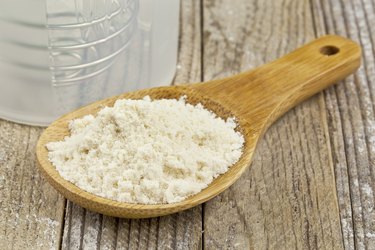
You love your whey protein shake: It tastes like a milkshake, helps your muscles heal after a workout and has boosted your daily protein intake enough to help you build muscle. But if it feels like whey protein gives you constipation, you're not imagining things.
First things first, whey is a protein-rich byproduct of the cheese-making process, according to the Cleveland Clinic.
Video of the Day
Video of the Day
Ever heard of curds and whey? Well, whey is the liquid that's left over when milk curdles into curds (which are the main ingredient of cheese). When you pasteurize and dry this liquid, it becomes the whey powder that you add to your protein shakes.
There are a few types of whey powder, per the Cleveland Clinic, including:
- Concentrate: This type is often found in protein bars and drinks, and can contain a wide range of protein, lactose and fat.
- Isolate: This kind is high in protein and low in fat and lactose.
- Hydrolysate: This type is typically the easiest to digest because the protein is already partially broken down.
So, does whey protein cause constipation or make you poop? While some powders are gentler on your digestive tract than others, taking whey protein can indeed lead to digestive issues like constipation, diarrhea or nausea for some people, according to the Cleveland Clinic.
Here, learn the common reasons why whey protein can cause constipation and other digestive problems (and how to deal with it).
Warning
The FDA does not require supplements like protein powder to be proven safe or effective before they are sold, so there’s no guarantee that what you take is safe, contains the ingredients it says it does or produces the effects it claims.
1. It Contains Lactose
If you regularly experience constipation from whey protein, a milk sugar called lactose could be to blame. That's because whey is made up of milk proteins, and thus contains lactose, according to the Cleveland Clinic.
And whey protein constipation isn't the only symptom to look out for — protein protein can make you poop, too. Indeed, if you're lactose intolerant, the lactose in your powder can trigger digestive issues like:
- Diarrhea
- Nausea
- Bloating
- Cramping
Fix it: If you're lactose intolerant, opt for a whey protein isolate, which has the least amount of lactose per serving. You can also take over-the-counter lactase supplements to help your body break down lactose, according to the Mayo Clinic.
How to Stop Diarrhea From Whey Protein
Whey protein does cause diarrhea for some people. And if you can't stop this symptom after a protein shake, drinking plenty of fluids (particularly water) and taking over-the-counter antidiarrheal medicine can help, per the Mayo Clinic.
2. It Can Contain Added Sugars
Another potential reason why whey powder causes diarrhea and other gastrointestinal issues is because these products can contain added sugars or artificial sweeteners, according to the Cleveland Clinic.
For some people, ingesting all that sugar at once can trigger diarrhea, per Harvard Health Publishing. And according to the Mayo Clinic, sweeteners like sugar alcohols, stevia and luo han guo can lead to gas, bloating and diarrhea.
Fix it: If whey protein and gas seem to go hand-in-hand for you, check the label before you buy to make sure that whey is the only ingredient listed, according to the Cleveland Clinic.
Tip
Some protein powders can also contain additives like artificial flavoring or fillers, per the Cleveland Clinic, which could further contribute to your symptoms.
3. It Doesn't Contain Fiber
Even if you're using a product that only contains whey, protein powder constipation can still be hard to avoid. That's because these powders don't contain fiber, a crucial nutrient for preventing constipation.
What's more, eating all that protein can fill you up and potentially deter you from eating fiber-rich foods like fruits and vegetables, according to Harvard Health Publishing. This can further contribute to constipation from whey protein.
Fix it: There's no magic high-fiber protein powder for constipation, so make sure you're eating plenty of fibrous foods to prevent digestive issues from a high-protein diet.
Per the 2020-2025 Dietary Guidelines for Americans, adults should aim to eat between 22 and 34 grams of fiber per day (14 grams for every 1,000 calories eaten).
- Harvard Health Publishing: "The Hidden Dangers of Protein Powders"
- Cleveland Clinic: "Is Whey Protein Good for You?"
- Mayo Clinic: "Lactose Intolerance"
- Harvard Health Publishing: "Is something in your diet causing diarrhea?"
- Mayo Clinic: "Artificial sweeteners"
- U.S. Food and Drug Administration: “FDA 101: Dietary Supplements”
- Mayo Clinic: "Diarrhea"
- Harvard Health Publishing:"Extra protein is a decent dietary choice, but don’t overdo it"
- U.S. Department of Agriculture and U.S. Department of Health and Human Services: "2020-2025 Dietary Guidelines for Americans"
Was this article helpful?
150 Characters Max
0/150
Thank you for sharing!
Thank you for your feedback!
Is this an emergency? If you are experiencing serious medical symptoms, please see the National Library of Medicine’s list of signs you need emergency medical attention or call 911.